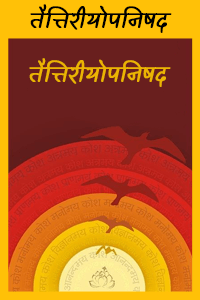Read Taittiriya Upanishad in English

Taittiriya Upanishad: An Introduction
Taittiriya Upanishad is a part of Taittiriya Aranyaka under the Taittiriya branch of Krishna Yajurveda. Out of the ten chapters of Taittiriya Aranyaka, the seventh, eighth and ninth chapters are called Taittiriya Upanishad. This Upanishad gives special emphasis on Brahmavidya and self-knowledge and Shankaracharya has also considered it important.
Commentary of Lord Shankaracharya:
Shankaracharya has written a thoughtful and logical commentary on Taittiriya Upanishad. In the sub-section of this Upanishad, he has stated that knowledge is the only means of attaining the ultimate selfless state of salvation. Shankaracharya has refuted the view of Mimamsakas that salvation can be achieved through karma. Describing knowledge as the only means, he has proved the impermanence of both class and karma.
Clause and Conjunction:
Taittiriya Upanishad is divided into three sections:
1. Shikshavalli:
It has 12 Anuvakas and 25 Shlokas.
It is also called Samhiti Upanishad.
2. Brahmanandavalli:
It has 9 Anuvakas and 13 Mantras.
It is also called Varuni Upanishad or Varuni Vidya.
3. Bhriguvalli:
It has 19 Anuvakas and 15 Shlokas.
It describes the Sagun form of Brahma and Brahmavidya.
Main idea:
1. Brahmananda and Bhriguvalli:
Brahmavidya has special importance in these sections.
The nature of Brahman is described as Truth, Knowledge, and Infinity.
Human life has been guided towards the realization of Brahma and attainment of bliss.
2. Origin of creation:
The origin of Brahma and the process of creation have been discussed in detail.
There is a description of the creation of the Saguna form of Brahma by Bhrigu, which happens through the Saguna symbols like Sat, Chitta, Anand, and Prana etc.
3. Nature of happiness:
In the seventh verse, the origin of the universe is explained from ‘Asat’, which is the definitive word of the unmanifest Brahman.
A unique form of bliss has been described, which is extremely blissful in the entire creation and through which the listener attains complete bliss.
Conclusion:
Taittiriya Upanishad holds an important place among the Upanishads. It details the deep principles of enlightenment and Brahmavidya, which guide human life towards the realization of Brahma and the attainment of supreme bliss. Shankaracharya's commentary gives it even more importance, in which he has described knowledge as the only means to attain salvation. The teachings contained in this Upanishad are as relevant today as they were in ancient times.